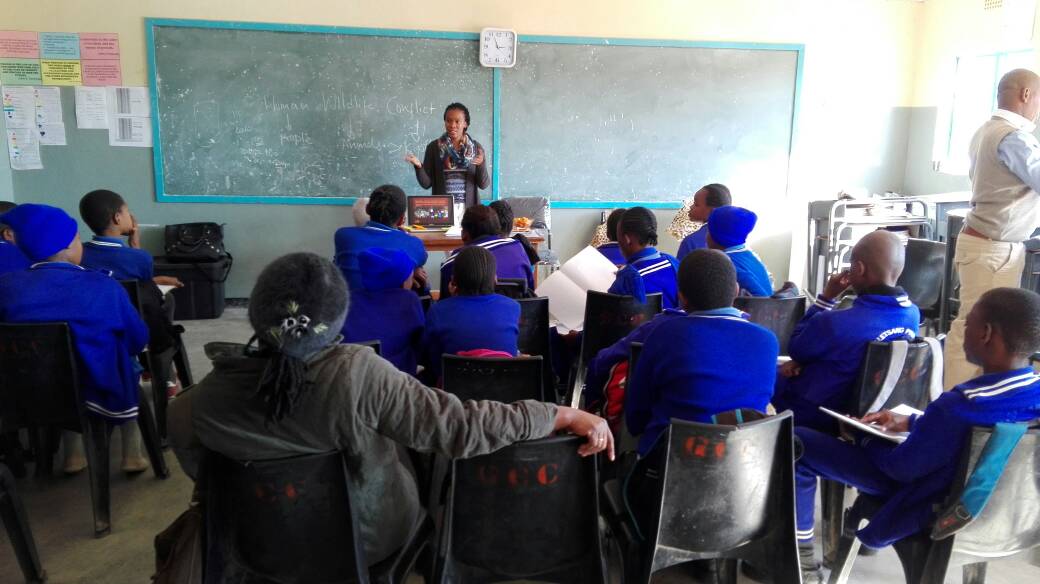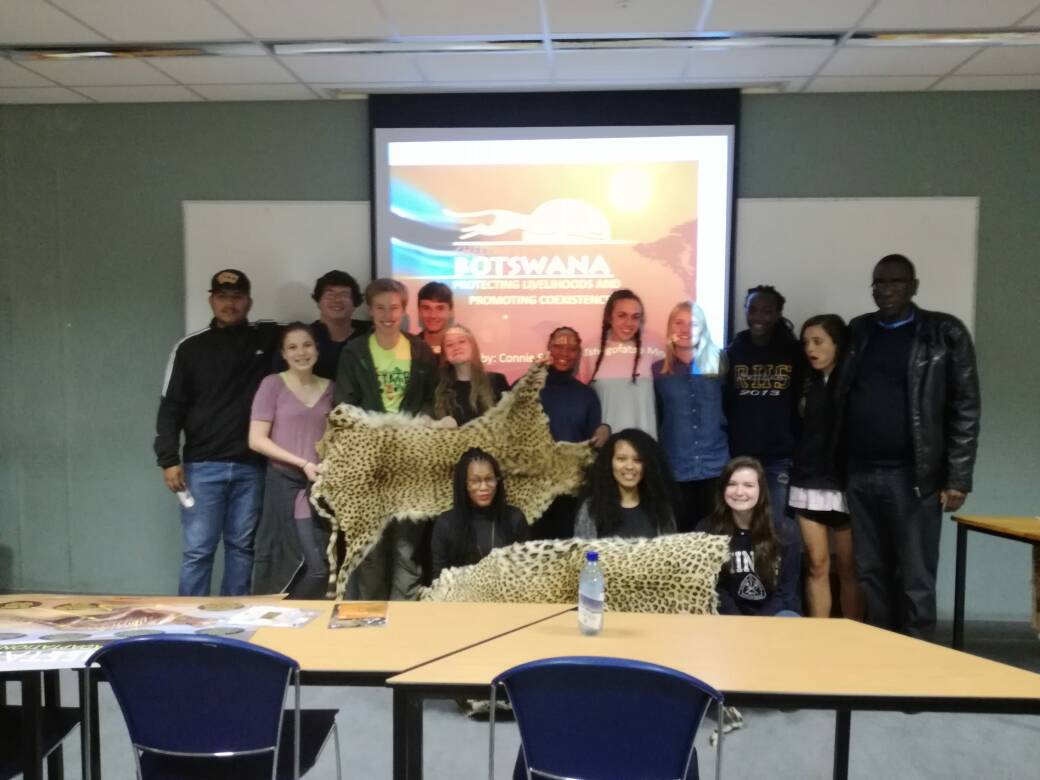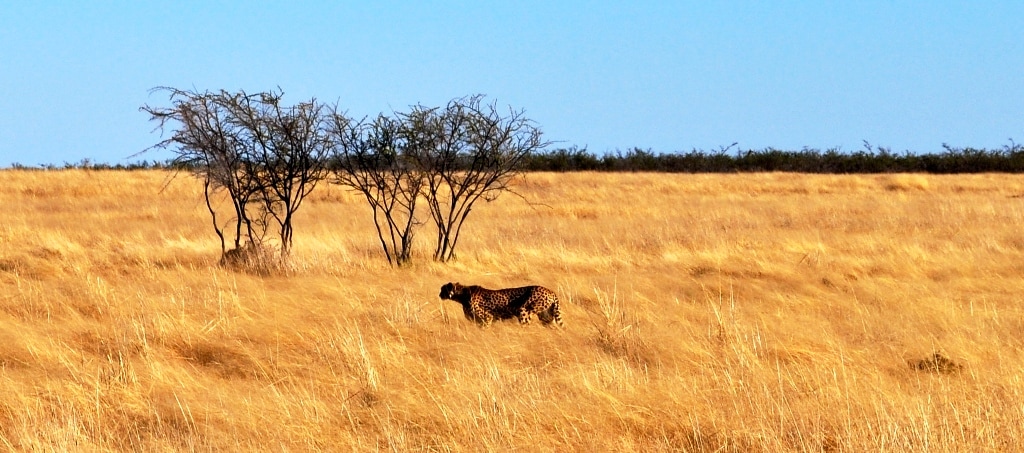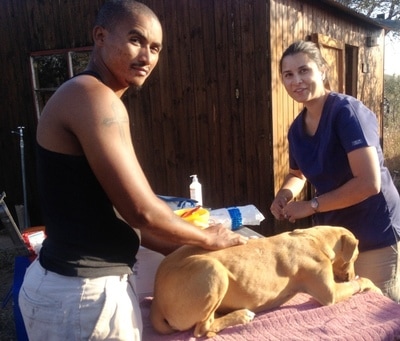|
As CCB continues to recruit conservation ambassadors through information sharing, yet again the education team had a school visit to Galaletsang Primary School’s environmental club in Gaborone to share their works as well as engage with the students on a discussion topic ‘Human Wildlife Conflict’. The educative engagement, which was a success, was showered with the presence of 38 STD 7 students of the EE club and 2 teachers.
0 Comments
On the 19th June 2017, CCB was pleased to present for a group of students involved in the ‘Global Navigator High School study abroad – Wildlife and Conservation’. The programme, which is a Council on International Education Exchange (CIEE), is a custom program that targets high school students aged 14-17 from various schools all over the United States of America.
The programme, allows participants to learn about conservation and the efforts of Botswana and its people through in-class work and outside of class field work. The programme allows American students to learn about conservation during a three-week placement involving direct instruction, field trips, fieldwork, camp fire discussions, and group discussions. CCB engaged this year’s group of students with discussions about Botswana’s enigmatic wildlife species, their threats and what the best ways are to secure wildlife a safe future. CCB works hard to eliminate the possible extinction of cheetahs in Botswana by facilitating coexistence between cheetahs and the farming community. Coexistence will only be possible if all join in and work together. Like the American author Keith Farrazzi once said “ Power today comes from sharing information, not withholding it.” We are excited about this new partnership and hope the students will take the conservation message back to their homeland and share it far and wide. Today the world celebrates United Nations World Environment Day under the theme, Connecting People with Nature. This is a time to go back and reflect on what it means by being one with nature, it is a time to go out and breathe in the beauty of nature, enjoy it, appreciate it, take a moment to think of the world without that beauty and if this is something we want to live without. Cheetahs are at the brink of extinction with around 7100 individuals left in the world, with habitat loss and human persecution being the biggest threat to their decline. Because of their wide ranging nature and competition from larger carnivores within protected areas, they get driven into farmlands where face conflict with farmers. When cheetahs inevitably prey on livestock and this leads to confrontation that results in cheetah deaths by shooting, trapping or poisoning. Our aim at CCB is to facilitate coexistence between cheetahs and the farming communities in Botswana to battle the cheetah decline through a holistic and community based approach. This serves to bridge the knowledge gap about carnivores and their importance in a healthy balanced ecosystem, and puts emphasis on the importance of involving the farming communities in all conservation efforts to foster tolerance of carnivores. This approach calls all to join in and work together to eliminate the possible extinction of threatened species, including the cheetah, by creating a healthy ecosystem that will allow all to benefit. At the end of it, we should all remember that we cannot live without nature nor can nature live without us so we need to strike a balance and coexist for people and wildlife to thrive altogether. It is our responsibility. Happy World Environment Day!
Cheetah Conservation Botswana (CCB) embarks on various activities to support farmers in areas where cheetahs thrive, such as the regions of Jwaneng and Ghanzi in the south and west of Botswana. Improved kraaling (corralling) practices and promoting the use of livestock guarding dogs (LGDs) in protecting livestock against medium-sized carnivores are among the farming strategies that can be utilised to minimise human wildlife conflict. LGDs are very effective at protecting livestock from carnivore attacks, and as such, they reduce the chance of cheetahs being killed by farmers. CCB’s LGD placement programme helps train LGD puppies so that they can be placed with farmers who live alongside cheetahs. CCB houses puppies of five to eight weeks old and trains them for two months, before placing them with farmers that experience conflict with carnivores. At the age of six months, the LGDs receive free sterilization (spay and neuter) as a way to control movement, improve performance and to help guard against diseases. After the operations take place, CCB community officers monitor the recovery of the dogs as well as offer support in the ongoing health and training of these dogs.
In December 2016 CCB placed 11 LGD puppies with farmers across the Ghanzi District. Thanks to a great working relationship with Vetswana, a Botswana-based veterinary practice, CCB is able to provide free sterilizations and other health care for all the LGDs that we supply to farmers. On the 30th May 2017, in collaboration with Vetswana, nine LGDs received sterilizations, with the operations taking place at the CCB Ghanzi research camp clinic. All dogs have reported to be doing well after the operations and all are back to their normal duties. Thank you once more to Vetswana, the CCB team and the farmers for their efforts in making sure that these dogs are in a top form to perform their duties. |
SearchArchives
May 2024
Categories |






 RSS Feed
RSS Feed
